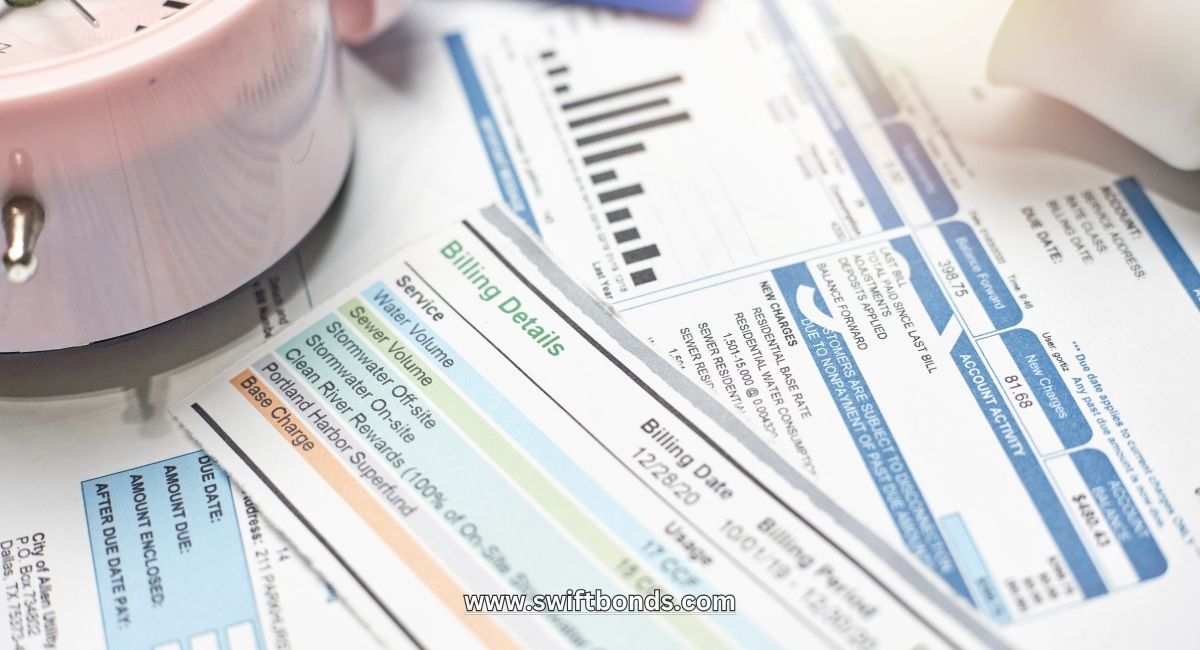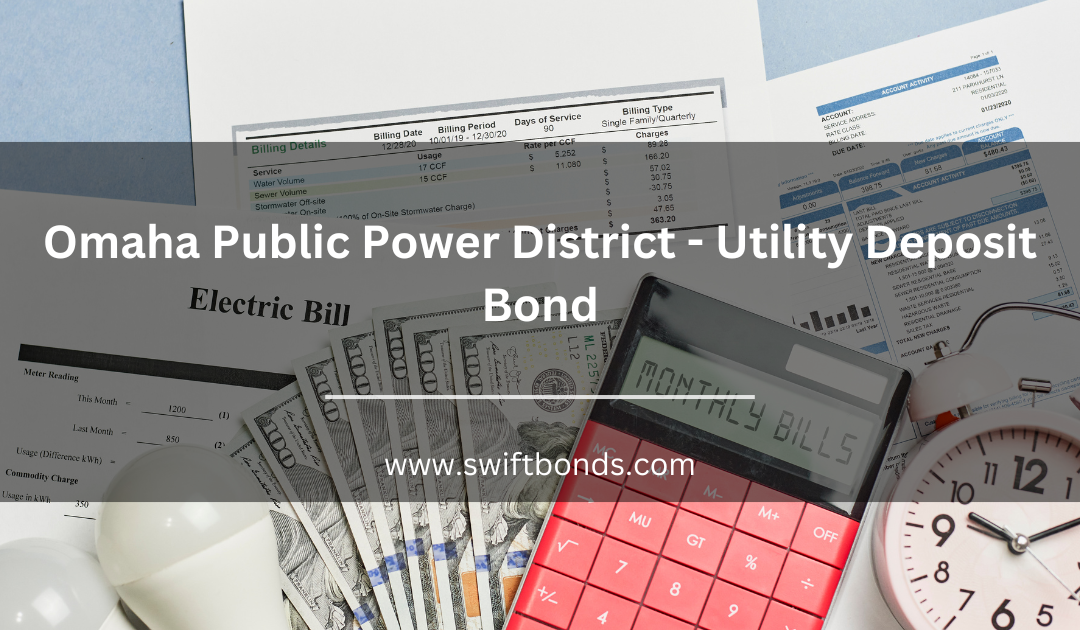Get an Instant Quote on Utility Deposit Bond
Introduction
From our perspective, many businesses in Omaha depend on uninterrupted utility services to maintain daily operations. Whether you’re opening a new commercial property, launching an industrial site, or managing a large-scale residential project, the Omaha Public Power District (OPPD) often requires a financial guarantee before activating service. That’s where the Omaha Public Power District – Utility Deposit Bond becomes a smart solution.
This surety bond acts as a substitute for a traditional cash deposit. Instead of tying up thousands of dollars in upfront payments, businesses can submit this bond as a commitment to pay for power usage. It assures OPPD that electricity bills will be paid on time and in full. If they aren’t, the utility can make a claim against the bond, and the surety will settle up to the bond amount—then collect reimbursement from the business.
This mechanism frees up working capital while building credibility with the utility provider. It works much like other compliance-driven instruments in Nebraska, such as the Nebraska - Private Postsecondary Career School Agent Individual ($5,000) Bond, offering trust through a third-party guarantee.
Why Utility Bonds Like This Can Be Confusing for Omaha Businesses
We’ve noticed that many business owners misunderstand why the utility requires a bond instead of a deposit. Some believe it’s punitive or tied to poor credit. But in reality, OPPD uses risk-based guidelines that apply to all new or expanding accounts with significant power demands.
Others think a letter of credit or security deposit is the only way to proceed. That can be restrictive. Tying up cash in a deposit account reduces liquidity and can slow down business operations. The bond offers the same guarantee—without the cash freeze.
Confusion also arises around how the bond is structured. Unlike insurance, which transfers risk, a surety bond is a three-party agreement between the principal (you), the obligee (OPPD), and the surety (Swiftbonds). If the bond is triggered, the business is still responsible for reimbursement.
This structure mirrors other Nebraska-specific bonds like the ERISA Bond Policy – Nebraska, which also operates with fiduciary responsibility and built-in recourse.

How Swiftbonds Simplifies the Process for Omaha Clients
Based on our experience, Swiftbonds understands what utility providers like OPPD need—and we help businesses meet those requirements without delay. The goal isn’t just approval; it’s making the entire bonding process easier and faster for Omaha businesses.
Here’s what our process typically includes:
-
Straightforward Applications
Our online form requires minimal paperwork and can be completed in minutes. -
Same-Day Approvals
Most applicants receive a decision within 24 hours—often faster. -
Direct Filing Support
We send your bond directly to OPPD or provide it to you to file. -
Competitive Rates
Premiums are typically a fraction of the total bond amount and reflect your credit and financial profile. -
Ongoing Compliance Guidance
If the utility updates its bonding language or procedures, we help you stay compliant.
It’s not unlike how we help clients with niche regulatory tools such as the Nebraska - Private Postsecondary Career School Agent Individual ($5,000) Bond, where our familiarity with the form and process creates clarity where there might otherwise be confusion.

Clear Steps for Securing the Omaha Public Power District Bond
What we’ve discovered is that many clients don’t need a long checklist—they just need a clear path. Here’s how to get bonded quickly and confidently:
- Request Bond Amount from OPPD - Contact OPPD’s customer service or commercial account department to confirm your required bond amount.
- Apply with Swiftbonds - Submit basic business information, ownership details, and financials (when needed).
- Get Bond Approval - Our underwriters assess the risk and issue the bond. If your credit is strong, no collateral is needed.
- File the Bond - Submit the bond to OPPD and maintain active coverage while service is connected and ongoing.
- Renew as Required - OPPD may require the bond to remain in place for a year or more, depending on account activity.
This plan removes the uncertainty and empowers businesses to focus on operations—not compliance hurdles.

Risks of Not Understanding the Utility Bond Requirement
In our observation, businesses that delay service start-up over deposit misunderstandings lose more in time and revenue than the bond would have cost. The Omaha Public Power District has clear policies—if a deposit or bond isn’t in place, power will not be connected.
In some cases, a new business delays opening because they were not aware of the bonding option and were trying to secure funding for a large cash deposit. Others risk disconnection after launching because their bond was not renewed on time or contained incorrect language.
These pitfalls are similar to what happens with fiduciary bonds like the ERISA Bond Policy – Nebraska, where a lapse in coverage can result in noncompliance with federal law or administrative penalties.

Why This Bond Works for Growing Nebraska Businesses
We’ve learned that using the Omaha Public Power District – Utility Deposit Bond offers businesses several distinct advantages:
-
Preserves Cash Flow
Keep more working capital available for payroll, rent, marketing, or equipment. -
Expedites Utility Setup
Avoid delays and get electric service connected faster. -
Builds Trust with the Utility Provider
Offering a bond demonstrates responsibility and professionalism. -
Can Be Reused
If your bond is renewed and maintained, you won’t need to pay a cash deposit in the future—even with expanded service. -
Compliance Made Simple
With Swiftbonds handling the paperwork, renewals, and filings, businesses stay compliant with ease.
This is especially valuable for contractors, developers, and industrial operators who face similar bonding requirements for other utilities or construction licenses across the state.
Nebraska Bonding Requirements and State Compliance
In Nebraska, utilities and government agencies often require financial guarantees via surety bonds. While not governed by the Nebraska Little Miller Act (52-118), utility bonds like this follow similar procedural logic, particularly for large commercial accounts.
OPPD, as a public utility, has the right to require financial assurance under its own rate and service policies. These policies are available through the Omaha Public Power District’s website or customer service office.
Failure to comply with bond requirements may result in delayed service, higher fees, or contract termination.
For questions about your obligations under Nebraska state law or public utility regulations, contact the Omaha Public Power District directly or visit their official portal at oppd.com.
Conclusion
We’ve come to appreciate how the Omaha Public Power District – Utility Deposit Bond serves as a reliable and cost-effective alternative to cash deposits. For businesses operating in Omaha, this bond provides access to power without financial strain—freeing you to grow, expand, and focus on what really matters.
At Swiftbonds, we’ve supported contractors, property owners, and industrial clients across Nebraska, helping them meet bonding requirements for utilities, schools, and government contracts. Whether you're fulfilling utility obligations or obtaining a niche bond like the ERISA Bond Policy – Nebraska, we're here to guide you with speed and accuracy.
Let’s get your power connected—reach out to Swiftbonds today and keep your operations moving forward with confidence.
Frequently Asked Questions
What does the Omaha Public Power District – Utility Deposit Bond cover?
We’ve often noticed that customers think this bond covers repairs or service outages. It doesn’t. This bond guarantees payment for electricity bills if the account holder defaults.
How is this bond different from a utility deposit?
We’ve often noticed clients assume the bond is extra. In reality, it’s a substitute for a cash deposit and can be more affordable than posting thousands upfront.
Who needs this bond in Omaha, Nebraska?
We’ve often noticed confusion around eligibility. Commercial and industrial accounts with high usage or risk categories may be required to post this bond before power is connected.
Can I get denied for this bond?
We’ve often noticed concern around qualification. While approval is based on credit, Swiftbonds works with all applicants and offers flexible options—even for challenged credit.
How long is the bond valid?
We’ve often noticed uncertainty around duration. OPPD sets the required term, but most bonds are annual and must be renewed until the utility waives the requirement.


